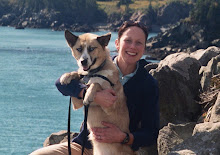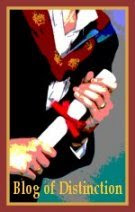Our cat, Cam, is sick. It came on suddenly, and by the time we took her to the vet's office for a diagnosis, she couldn't even stand up on her own. They give her IV fluids and take her blood. They suspect kidney failure, but tell us we won't know for certain until the tests are returned.
The next day, Cam's vet--Dr. Townsend--calls. It's worse than he thought. At best, she'll live another day or two. And they will be painful days. Just after eleven that morning, Greg and I agree: it's time to intervene. We wrap Cam in her favorite fleece blanket and take her to the truck. On the ride over, she curls herself around my leg and rests her chin on my foot. She wants me to protect her. She feels safe with me. I want her to be angry with me. To fight and resist. But it’s too late for that. For the first time in her short life, she is feeble resignation.
Greg and I sit in the parking lot with Cam for several minutes before entering the clinic. I resist the urge to run away. To wrap this little striped cat in her blanket and take her somewhere else where she can spend the rest of her life in peace. But that, too, seems cruel. There will be no more peace in her life. We walk inside.
They’re expecting us, and quickly usher us past the waiting area and into a private room. Cam burrows into my arm. I cry, telling her it will be okay. The lie makes me weep harder.
Matt Townsend enters the office and introduces himself to Greg. He is considerate and polite. He tells us he is very sorry. I know he means it. He explains what will happen and asks us to sign a consent form, then leaves to prepare the drugs that will end Cam’s life. First, he administers the same sedative she received the night before. This time, though, she resists its effects, raising her head jerkily each time she hears a noise. She does not want to go to sleep. I think she knows it’s forever this time. Dr. Townsend leaves us for a few minutes, then returns with a young, pretty vet tech, who nods her head shyly at us. This is hard for them too.
They shave Cam’s front forearm and swab it with alcohol. The drugs will be administered intravenously and will be instantaneous. Even with the saline infusion last night, she is dehydrated and it takes them several tries to find her vein. “Come on, sweetheart,” Matt whispers. “Don’t make this hard for us.” She consents. A minute later, she is gone.
The four of us stand awkwardly, looking at the floor.
“This is your room,” Matt tells me and Greg. “No one else will use it for the rest of the day. Take as much time as you need.”
He leaves with the technician. They have dozens of patients to see today. Behind the door, I can hear them greeting a new dog or cat. The sound is very far away and yet uncomfortably close. I want the world to shut down—just for a minute.
Cam’s beauty has returned in her death. Her eyes are clear and moist, no longer dilated with discomfort. I stroke her head and ears, then run my finger along her paws. It is inconceivable to me that she is gone. Greg cries behind me. Cam is his cat, too, and he has not seen her worsen over the past two days. Her death must feel even more jarring to him.
After some time, we wrap her limp body in the fleece blanket and take it to the truck. It feels heavy on my lap. Popular wisdom has it that the human body loses 21 grams in death. But Cam feels heavier, as if her life has been replaced by lead. Throughout the long ride home, her body sinks deeper into my lap until I wonder if I will be able to lift it. I remember the weight of that small doe. Cam feels at least that heavy now. Maybe more.
Back home, we leave her in the truck and take shovels into the woods. There is room enough near Kinch’s grave, dug almost exactly one year earlier. We are surprisingly familiar with the routine. I set to collecting stones while Greg struggles to break tree roots and heavy earth. This grave will be smaller and shallower than the beagle’s. Perhaps because of that, or because we are becoming adept at the process, we dig Cam’s in a faction of the time. I walk slowly to the truck and collect her swaddled body, taking it back into the woods. But kneeling before the opened earth, I cannot release it. I cannot place her in the ground, where she will decompose in the dark and the cold.
“Take your time,” Greg says, placing his hand upon my shoulder. “We don’t have to rush.”
I clasp her body to my chest. Even in the weightiness of death, it feels familiar. I will never hold it again, and this thought slays me. I rock back and forth, cradling her as if this will somehow bring her back. For a moment, I think that we don’t have to bury her—that there must be some way to keep her with us. But then I think about the fish and the doe and all of the other dead animals we’ve watched decay. I can’t see Cam endure a similar process.
Tibetan Buddhists have a class of individuals known as bone breakers. Called “domdens,” their jobs are to grind bodies into meal so that they might be consumed by vultures and, thus, transported high into the sky. I want to give Cam the same feeling of liberation. But I am no domden. I cannot break this little body. Instead, I lower the blanket into the jagged hole, smoothing her swaddled form and making sure she is tucked in tight. We spread the dirt upon her—a carnal sweep that cakes our hands and sweat-soaked arms. There is power in this process of burial. I don’t think I ever understood it before this moment. When Kinch died, I was more concerned over the poignancy of Greg’s grief than I was my own sadness. But this time is utterly selfish. I know only the heartbreak I am feeling and the shred of comfort I find from balling my fists deeply in the cool dirt then packing Cam’s body in that same solidity.
We pile stones on top of the earth, building them into a smaller version of Kinch’s warrior cairn. Then we return, briefly, to the sunlight of our yard, where we pick bouquets of daisies and black-eyed susans. One for the new small grave; another for the larger one that has settled over four seasons.
As we walk back towards the house, I spy a triangular face peering out from the kitchen window. Tall, black-tipped ears; thick tawny fur; blue eyes and a grin. She barks a greeting and whines impatiently. We are still excluding her, and she’s had enough.
I do not want to see this young dog, so exuberant and curious. I do not want to feel the thickness of her life, or be reminded of her endless pursuit of my now-dead cat. I resent both: the former because it reminds me of what Cam no longer has; the latter because I worry it hastened her death. I walk away from her when she greets me at the door, then retreat upstairs and fall asleep.
Greg takes Ari on her evening walk and wakes me to ask if I want dinner. I do not. I want Cam—that’s all.
Later that night, I curl into a cat-sized ball on the futon in my office. The T.V. is on, but I do not notice. Instead, I stare straight ahead, watching my own grief. I have always believed in euthanasia—for all creatures. Greg and I swore we would use it as a way to end terminal illness when discomfort outweighed vitality in any of our pets. We’ve even wished for the same in our own demise. But sitting here in the shadow of Cam’s death, I find myself burdened by responsibility and guilt. Who am I to say that, given the choice, she would have preferred a hastened death to another few days of mitigated existence? I worry that I have done the wrong thing. I fret that I have taken a life not mine to take. I beg forgiveness from anyone able to give it, then try contenting myself that I made the right choice. But did I? I don’t know. I return to the original questions.
I had no idea the after-effects of this decisions would be so hard. The circularity of my reasoning continues for hours as I hop wildly through the various stages of grief. When I finally stir, I notice for the first time that I am not alone in the room. Ari has been with me, too—curled up under the desk and observing me nervously. She is uneasy and seems timid, folded tightly in the back reaches of the desk well, where she might be safe.
From what? Me, I suppose.
I look down at her warily. My emotions are raw and short-circuiting right She curls into a tighter ball, as if willing herself to disappear entirely. But she does not leave; nor does she turn her face away. Instead, she stares at me from beneath the desk. She looks hopeful. She is watching my face carefully, as if to anticipate what I am going to do. As far as she is concerned, I am highly unstable right now—just shy of a crazy person, really. Whether or not she knows Cam is gone, she knows that I am—at least the version of me she has encountered for the past six months. Still, we have pledged to live as a pack. She looks as if she might be reminding me of as much. She cannot understand why I am withholding my affection. Has she done something wrong?
I have no way of knowing, of course, if this even resembles her actual thought process at this moment. But the faintest suggestion that she might be entertaining these ideas is enough to stir me from the depths of my grief. I am mourning an animal dead and buried, while a living creature cowers near me. This is not grief; this is cruelty.
I look at Ari again. She raises her head and tilts it just ever so slightly. It’s enough though—I’ve been studying her body language, too. She’s asking if it’s all right—if she has permission to come over and say hello. How could I say anything other than ‘yes, yes, oh please, yes!’ And so that’s what I do. She asks again. Are you sure it’s all right? Are you okay?
I’m not okay—not yet. But I love this dog, all the more because she is here to love. I pat my thigh, and whisper quietly to her. She unfolds her limbs and rises from the desk. For once, she does not resist when I wrap my arms tightly around her. I need to do this. She knows that.
And it’s okay.
Monday, August 20, 2007
Subscribe to:
Post Comments (Atom)


















0 comments:
Post a Comment